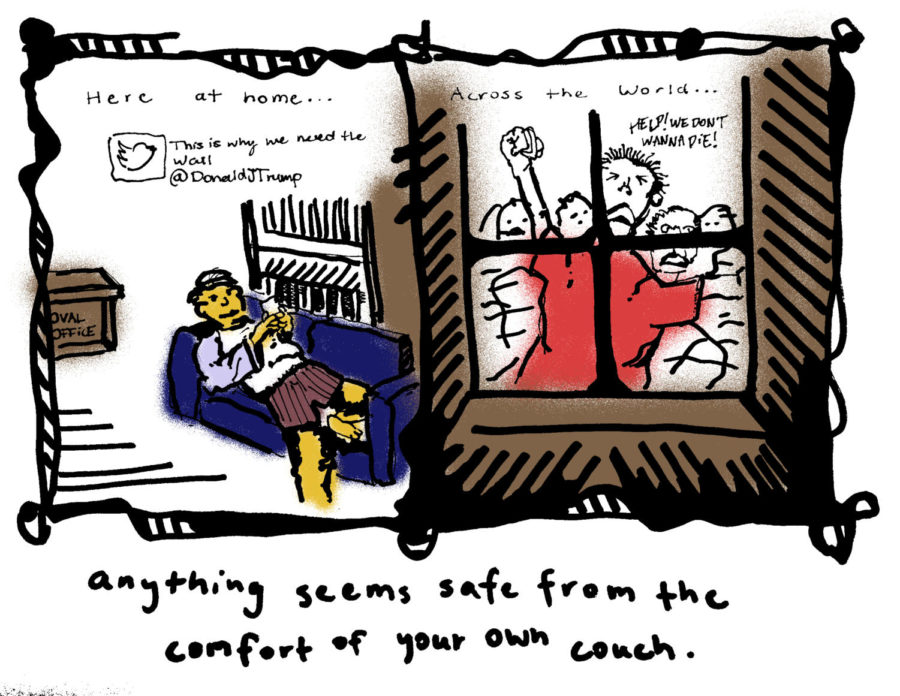Violence in Egypt shocks the world
The recent terrorist attack in a crowded mosque has made it into history as Egypt’s bloodiest incident in modern history, leaving pain and destruction behind.
On November 24, the Al Rawda mosque located in Bir al-Abed, 125 miles northeast of Cairo, was attacked by militants during Friday prayers. It left a frightening high death toll of 305 worshippers, including 27 children, and 128 injured, making this the bloodiest incident in modern Egyptian history according to local officials in Egypt.
According to witnesses and surviving victims, the terrorist attack was carried out by approximately 25 to 30 militants dressed in army-like uniforms, all heavily armed and bearing the Islamic State’s, commonly known as ISIS, black banners. The aggressors began the assault by detonating a bomb inside the crowded mosque, then blocking the exits and opening fire at the frantic victims who tried to flee the building.
According to The New York Times, attacks on mosques are unusual in Egypt. For many years, the Islamic State has been targeting churches but avoiding attacks on Muslim places of worship. This is why many citizens of the country were shocked and scared by the attack to the mosque since it shows that ISIS is willing to brutally eliminate any group that does not agree with their perspectives and opinions. The specific mosque was targeted intentionally due to its affiliation with a local Sufi order that ISIS strongly condemns.
The Sufi order has a more mystic view of Islam. Members of this division have traditionally shunned violence, renounced materialism, emphasized the inward search for God and are known as “the inward dimension of Islam”. According to Vox, Sufis also celebrate spiritual guides, believing that they help them have a relationship with God. This use of spiritual guides led ISIS to label them as heretics for going against the “main principle of Islam” and worshipping “idols”, consequently violating the uniqueness of God.
During the past few years, extremist groups have made many violent advances directed at the Sufi order. Examples of such violence were reported by The Washington Post, including the 2012 destruction lead by the Al-Qaeda of ancient mausoleums that housed Sufi saints in Timbuktu, followed by the 2016 execution of a notable 100-year-old Sufi cleric in Egypt. Just last February, the attack of worshippers who’d gone to pray at the tomb of a Sufi philosopher in southern Pakistan by militants allied with the Islamic State, leaving more than 80 dead.
Terrorist attacks are constantly reported and talked about on social media, especially if they happen in the Europe Union. According to the Global Terrorism Database, 6,081 attacks happened in the Middle East and in North Africa in 2016, while 395 assaults took place in Europe during the same year.
When faced with such a big difference in numbers, one is left to wonder why the most affected areas are, ironically, the same ones that appear the least in the news and are the least discussed around the world.
According to BBC News, on January 27 President Donald Trump signed an executive order halting all refugee admissions and temporarily barring people from seven Muslim-majority countries. Right after the mosque murder happened, Trump also commented on Twitter that the assault enforces the reason why the country “needs the WALL, needs the BAN”. Realistically, though, where are all the victims of these six-thousand attacks supposed to turn to, when they’re fleeing their countries to save their lives if so many countries like the U.S and the EU are now closing their borders to them and strengthening their refugee-policies?
The refugee ban signed by Trump included countries like Syria and Iraq, and according to Independent News, half of the population of Syria have been forced from their homes, 2.6 million Iraqis have also been displaced by the Islamic State. Meaning that many people in these countries are running away from their homes because of survival, only to be faced with countries banning them as if they were all to blame for the minority that consists of terrorist groups. As nations, we should be focusing on uniting to help those affected by these attacks all around the world, not on making it even harder for them to have any chances of a better future.
Your Turn Question:
1- Do you agree or disagree with the Ban and why?
2- What would you personally suggest to help solve this refugee crisis so present in the actual world?
3- Was there any information in this story that you had been previously unaware of? Did it change your point of view on any subjects?
4- What are your opinions on how to deal with terrorism and what are your ideas on its consequences to the victims?
5- Why do you think attacks on Muslim-countries are less reported by the news and less discussed in social media?





